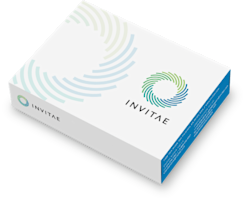
Invitae Elevated C16, C16:1, C18, and C18:1 Panel
Test code: 06116 •
Test description
The Invitae Elevated C16, C16:1, C18 & C18:1 Panel analyzes the two genes that are associated with elevations of C16, C16:1, C18, and C18:1 acylcarnitines on newborn screening (NBS) or plasma acylcarnitines. Genetic testing of these genes may confirm a diagnosis and help guide treatment and management decisions.
Ordering information
Turnaround time:
10–21 calendar days (14 days on average)New York approved:
YesPreferred specimen:
3mL whole blood in a purple-top EDTA tube (K2EDTA or K3EDTA)Alternate specimens:
Saliva, buccal swab, and gDNA are also accepted.Learn more about specimen requirementsRequest a specimen collection kitClinical description and sensitivity
Clinical description:
Elevated C16, C16:1, C18, and C18:1 acylcarnitines may be detected during newborn screening due to carnitine palmitoyltransferase II (CPT2) deficiency or, more rarely, carnitine-acylcarnitine translocase (CACT) deficiency. These disorders are indistinguishable upon newborn screening, plasma acylcarnitines, total and free carnitines, and urine organic acid analysis; enzymatic testing or molecular testing is needed to make the diagnosis.
Common features of CACT deficiency are hypoketotic hypoglycemia, hyperammonemia, hepatomegaly, cardiomyopathy and/or arrhythmia, and respiratory distress. Lethargy, coma, seizures, and hypotonia have also been reported in some patients. In addition to hypoketotic hypoglycemia with hyperammonemia, some patients may also have elevated creatinine kinase, liver transaminases, and metabolic acidosis. The vast majority of patients present at less than 30 days of age.
Phenotypes in patients with CPT2 deficiency can range in severity from a neonatal lethal form to an adult myopathic form.
Patients with the lethal neonatal form of CPT2 typically present within the first few days of life. Patients can present with hypoketotic hypoglycemia, hepatomegaly, liver failure, respiratory distress, seizures, cardiomyopathy, arrhythmias, facial dysmorphism, brain dysgenesis, neuronal migration defects (such as cystic dysplasia of basal ganglia or agenesis of the corpus callosum [Dandy-Walker malformation]), cystic dysplastic kidneys, and liver calcifications. Even with treatment, the prognosis is very poor in these patients.
Patients with the severe infantile form of CPT2 typically present within the first year of life. These patients typically have hypoketotic hypoglycemia, hepatomegaly, liver failure, cardiomyopathy, and muscle myopathy. Hypoketotic hypoglycemic episodes may be triggered by prolonged fasting or intercurrent illnesses. If left untreated, these patients are at risk of sudden infant death.
The most common form of CPT2 deficiency is the milder myopathic form, which is also the most common cause of hereditary myoglobinuria. Patients with myopathic CPT2 can present from early childhood to adulthood, although the majority present in childhood. Attacks are triggered predominantly by exercise, although intercurrent illness and prolonged fasting may also cause attacks. Patients can have muscle pain and weakness, rhabdomyolysis, and myoglobinuria during attacks, but they are generally asymptomatic between them. End-stage renal disease may be a long-term complication, particularly in patients with frequent myoglobinuria. Some infants with the myopathic form will have normal newborn screening due to the milder nature of this clinical subtype.
CPT2 and CACT are typically treated with a diet low in long-chain fatty acids and high in carbohydrates, with medium-chain triglyceride and carnitine supplementation. Patients with severe disease will have emergency protocols during intercurrent illness.
Assay information
Invitae is a College of American Pathologists (CAP)-accredited and Clinical Laboratory Improvement Amendments (CLIA)-certified clinical diagnostic laboratory performing full-gene sequencing and deletion/duplication analysis using next-generation sequencing technology (NGS).
Our sequence analysis covers clinically important regions of each gene, including coding exons and 10 to 20 base pairs of adjacent intronic sequence on either side of the coding exons in the transcript listed below, depending on the specific gene or test. In addition, the analysis covers select non-coding variants. Any variants that fall outside these regions are not analyzed. Any limitations in the analysis of these genes will be listed on the report. Contact client services with any questions.
Based on validation study results, this assay achieves >99% analytical sensitivity and specificity for single nucleotide variants, insertions and deletions <15bp in length, and exon-level deletions and duplications. Invitae's methods also detect insertions and deletions larger than 15bp but smaller than a full exon but sensitivity for these may be marginally reduced. Invitae’s deletion/duplication analysis determines copy number at a single exon resolution at virtually all targeted exons. However, in rare situations, single-exon copy number events may not be analyzed due to inherent sequence properties or isolated reduction in data quality. Certain types of variants, such as structural rearrangements (e.g. inversions, gene conversion events, translocations, etc.) or variants embedded in sequence with complex architecture (e.g. short tandem repeats or segmental duplications), may not be detected. Additionally, it may not be possible to fully resolve certain details about variants, such as mosaicism, phasing, or mapping ambiguity. Unless explicitly guaranteed, sequence changes in the promoter, non-coding exons, and other non-coding regions are not covered by this assay. Please consult the test definition on our website for details regarding regions or types of variants that are covered or excluded for this test. This report reflects the analysis of an extracted genomic DNA sample. In very rare cases, (circulating hematolymphoid neoplasm, bone marrow transplant, recent blood transfusion) the analyzed DNA may not represent the patient's constitutional genome.
You can customize this test by clicking genes to remove them.
Primary panel
Question about billing?
Find answers